Ice Fishing In Alberta
Ice fishing is a blast! Getting out into the nature, drilling holes in the ice, drinking beer, listening to music – how could you not like those things? You need to do it properly, though. I’ve done it both the right way and the wrong way. The wrong way is very cold, miserable, and not something I recommend. This guide will explain everything you need to know about ice fishing in Alberta so you can set yourself up for success before heading out. Our winters can be long and cold; might as well make the best of it? I hope this information is helpful for not only Albertans but anyone in general who might have an interest in ice fishing and are visiting our province.
- Also see: Places to fish around Calgary
- And if you’re completely new to fishing: Comprehensive guide to fishing in Alberta
What This Guide Covers
This guide will explain everything you’ll need to know to get started with ice fishing, written for people in Alberta. This guide assumes you have nothing and are starting from scratch. No gear, no license and no knowledge of how to actually get out there do ice fishing. We’ll cover which licenses you need, some basic gear suggestions and other tools to buy, how to choose a location, and most importantly, how to actually ice fish. Ice fishing gear isn’t that different from regular fishing gear, but there are a couple of tools that you’ll want to get to make your life easier.
We’ll take you through the basics and if you have any questions feel free to toss them in at the bottom.
Thanks, hope it helps. Have fun and goodluck out there!
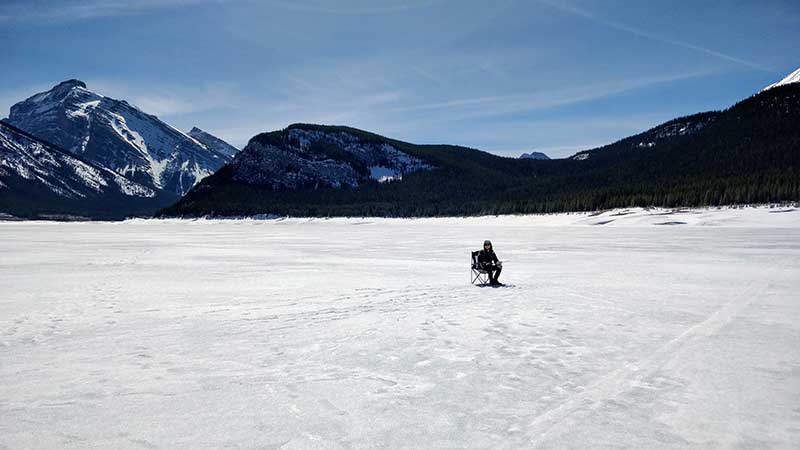
Step 1 – Buy A WiN Card
A WiN (Wildlife Identification Number) card is your account with the Alberta Government that fishing, hunting and trapping licenses are applied to. WiN cards cost $8 +GST and you can purchase them from a local retailer, or do it online. You’ll save $2 by buying it online. You can still request a physical card but you’ll have to pay for it. I’d recommend visiting Canadian Tire or The Fishin’ Hole if you have any questions, or phoning any fishing store.
- Buy a WiN card
- Before April 2020, WiN cards were physical cards and required renewal every 5 years
- After April 2020, WiN cards became virtual/online and no longer expire [details]
Step 2 – Buy A Fishing License
Fishing licenses are required for Albertans aged 16 to 64. Anyone younger or older is not required to get a license. You’ll need to purchase a new license each year/season. Licenses are available to residents of Alberta, and non-residents, although they have different costs. See: Fees for Sportfishing Licences in Alberta
- Buy a fishing license
- Fishing licenses are $28 for adults in Alberta
You will need to purchase a new fishing license each year/season. Each fishing season runs between April 1 until March 31.
- 2021 season: April 1, 2021 to March 31, 2022
- 2020 season: April 1, 2020 to March 31, 2021
- 2019 season: April 1, 2019 to March 31, 2020
- 2018 season: April 1, 2018 to March 31, 2019
- 2017 season: April 1, 2018 to March 31, 2017
Follow the Regulations!
Every body of water that has fish in it, in Alberta, also has regulations that must be followed. These regulations say what you can keep, if a body of water is open or closed, what bait can be used, and other important things. It’s very important that you familiarize yourself with the rules as ignorance is not an excuse. The information is available in print, online, through apps, and is easy to find through Google. People that do not require a license to fish in Alberta are still required to follow the regulations. Remember, if you don’t, shunnn!
Ice Fishing Gear
Even if you already have a regular fishing rod, reel and some tackle, you’ll still need to pick up some ice fishing gear to be successful and have a good time while out on the ice.
An Ice Fishing Rod
Ice fishing rods are built to withstand the downward pressure of a fish on the line right underneath you, rather than out a ways. You can get away with a regular fishing rod, but to have the most control and success landing big fish, you should get an ice fishing rod. They aren’t that expensive either! You can find rod/reel combos at Canadian Tire for as low as $20 if you watch for sales. For a good combo expect to pay around $40-$50 or more if you have the budget for it.
Ice Fishing Lures
There are specific ice fishing lures you should consider using, but more importantly it comes down to what you’re trying to catch. If you use a Northern Pike lure on a lake that has Yellow Perch or Whitefish, good luck. Trout can also be temperamental, so set yourself up for success with a little research beforehand.
I personally prefer to use lures that are meant for Walleye. The jigs sink quickly and all sorts of fish tend to go after them, including Trout.
Price: $33.99
2 used & new available from $33.99
More specifically for trout though, white grubs seem to work well. What works best will come down to trial and error, so get out there and try a variety of things.
Price: $27.84
1 used & new available from $27.84
Ice Augers
An auger is a tool used to bore big holes in things! They come in a couple of different flavours; gas powered and hand powered. Each have their advantages, but I personally prefer hand powered. Gas powered augers are certainly much faster at cutting through the ice, and it’s physically much easier to do, but I just find there’s something special about doing it by hand. It feels right, for me. Hand augers are also much cheaper than gas powered. Either case, your call! Can’t go wrong with either.
As you can see, quite a big difference in price between the two types of augers. If you can afford to get a gas powered auger, all the power to you! Keep in mind that with either type of auger you go with, the blades will need to be sharpened occasionally. It’s also worth checking Kijiji for a used auger.
Note: if you don’t feel like buying an auger, you can actually just bring a hammer or metal pipe or something like that to break open holes drilled by other people.
Ice Fishing Line
You will also need to pick up fishing line that was designed for ice fishing. Because of the temperature of the water being so cold, it can cause issues with your normal fishing line. Maybe it’ll coil up and be a huge mess. Or it’ll cause the line to break easily. Or it just won’t work because the fish will see it and stick their noses up at you. If you’re taking the time to go ice fishing, do it right and get some proper line too.
Fluorocarbon
One of the best things about using fluorocarbon line is that it’s almost invisible underwater. The harder it is to see, the less likely fish will think anything is suspicious. It’s also very sensitive so you’ll have an easier time picking up on the light bites and strikes. It’s also waterproof and quite strong and won’t have an issue with the rough edges of ice. Fluorocarbon will also sink faster than other lines. It also doesn’t stretch, so setting hooks is faster and more precise.
Monofilament
Monofilament fishing line is usually just called ‘mono’ line. Mono is typically made from a single strand of nylon and has a low ‘memory’, so it won’t coil or kink up on you like the lines made of harder materials. Mono stretches too, which makes things easier on the fish themselves when setting hooks as it likely won’t rip a hole in their flesh, but at the same time provides less sensitivity. Mono is also about a ‘medium’ on the visibility factor, but it’s also quite strong and lightweight. It sinks slower than other lines and it’s super easy to tie knots with. Monofilament fishing line is also quite inexpensive compared to others. In addition to all of that, mono lines come in a wide variety of colours, so you can either be stealthy and blend in with your water you’re fishing in, or get something super bright so you can watch for strikes.
Copolymer
Co-polymer is a different kind of mono filament fishing line made from two or more nylon strands during the manufacturing process. Co-polymer tends to be thinner than mono filament and fluorocarbon lines, but the trade off is it offers less stretch and give to the line. Co-polymer line is quite sturdy, and the stiffness of the line makes it great for keeping an eye on the sensitivity – don’t want to miss those little bites. It is more visible than fluorocarbon line, and co-polymer is also heavier so it’ll sink faster. It is a little more pricey though, than the other options.
Izorline 27028 Platinum Co-Polymer Mono Line, 6-Pounds by 300-Yards, Clear
Price: $14.50
2 used & new available from $14.50
Braid
Braided fishing line is great if you’re in a heated hut, but if not, it absorbs water and freezes up and is just annoying to use in colder temperatures. It’s especially hard to tie if it’s cold and frozen. It’s super strong, but also quite thick, so it’s a good idea to use a low visibility leader before the hook too. I personally don’t like using braided line, but maybe I just haven’t found one I like yet?
Other Ice Fishing Tools
Scoop/Skimmer
This is basically just a giant ladle spoon with holes in it so you can clear away the slush and ice from inside the hole after you’ve drilled it. Also the water tends to freeze up on the surface if you aren’t constantly jostling it, and you really don’t want to use your hands to pull the ice out, so use a scoop. Brrrr. Although Amazon does sell them, I’d recommend going to a dollar store and buying a cheap kitchen sieve as it’ll work just as good as something store bought. Just don’t drop it in the hole, you’ll never get it back.
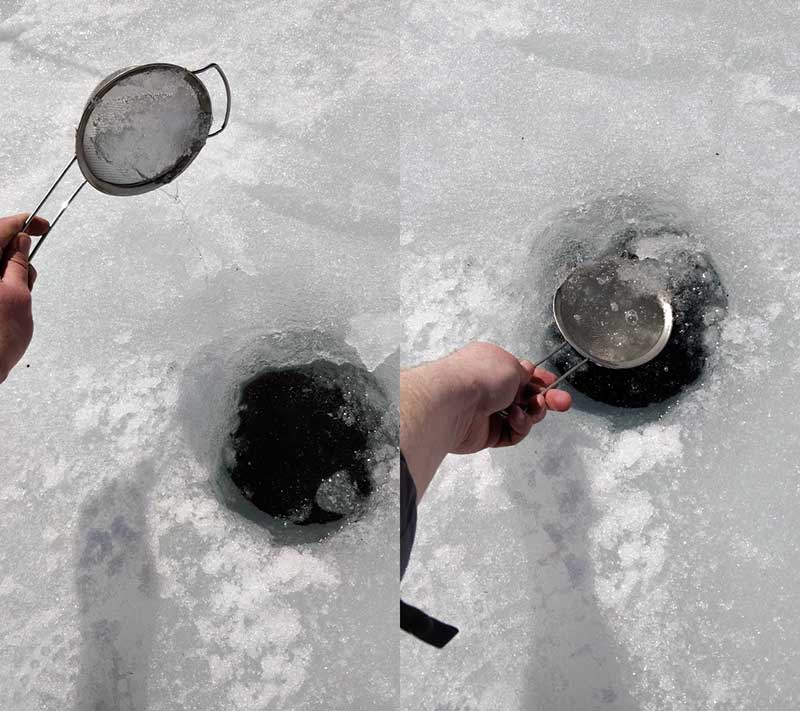
Tip Ups (Fishing Traps)
A tip up is a fishing trap you lay over the hole. Some have bells, some have flags, some have LED lights but they all do the same thing – allow you to drop down a line while monitoring it from a distance. You can cheap out here, no need for anything fancy. You could probably build your own without much trouble, but it’s easier to just buy something.
Brocraft Ice Fishing Tip-Ups / Ice Fishing Rod Holder / Ice Fishing Tip Down / Ice Fishing Rigger
Price: $41.99
1 used & new available from $41.99
Underwater Video Cameras
These are certainly not required to go ice fishing, but an absolute luxury item if you do have one with you. They allow you to see the fish under the ice, or, more importantly if there aren’t any fish under the ice. Underwater cameras can also help you strike more accurately (because you can see what’s happening). They range in price, starting at around the $200 mark.
Here’s a basic video on how these things work. They’re small, quick, and can really help you locate the fish under the ice, and watch for strikes.
Camping Chairs
You’re going to want something to sit on. I suggest a regular old camping chair. Something that has a beer holder for maximum leisure. Walmart probably has a basic camping chair for 5 bucks.
Or you could go wild and get a love seat camping chair.
A Sled To Pull Everything On
This depends on where you go and how deep the snow is, but it’s a good idea to bring a sled with you to pull all your gear from the vehicle to the fishing spot. Trust me though, if you’re stomping through 3 feet of powder snow, you aren’t going to want to be carrying a bunch of awkward equipment. Canadian Tire probably has some cheapo options, or Walmart. Get something like this:
Check The Weather, Dress Appropriately
I cannot stress how important this is. If you didn’t read my little story at the top of the page, here’s a TLDR; ice fishing can be very cold and you need to dress appropriately for it or you will be miserable. But hey? It might not be cold! This part is up to you. Check the damn weather before you head out. If you can somehow plan around going out while there’s a Chinook rolling in over the mountains (if you’re in Alberta), absolutely go out ice fishing during a Chinook! The warm sun will not only heat the whole area, but it’ll bounce off the ice and keep you so warm.
If it’s going to be cold and windy, I’d suggest not going at all. If you must, make sure to dress warm. Especially your feet. Protect your feet.
Also, if you can, wear water proof gloves/mittens. Jeans (with or without long johns) are usually okay, unless it’s going to be chilly, then I’d wear snow pants as well. It’s so miserable if you get wet, because then you’ll get cold real fast. No fun. It’s much better to be over-prepared than under when it comes to ice fishing. Don’t screw around with the elements.
Other Things to Bring
You’re going to be spending a few hours out in the elements, so there’s some other things you may want to bring with you too. Also you’re going to get hungry.
Food
You’ll want to bring food and snacks that are easy to eat with wet/full/dirty hands, but ultimately it comes down to what you feel like dragging out there with you. If you have a gas powered stove, you could make smokies or burgers out on the ice. I would actually recommend bringing firewood so you can have a campfire on the ice! Other snack ideas: lots of beef jerky, pepperoni sticks, bags of peanuts, energy bars, granola bars, peanut butter and jam sammiches, pretzels, Babybel cheese, cashews, candy, Doritos. Don’t forget to bring water too.
You could even bring shrimp + seasoning. Get creative!
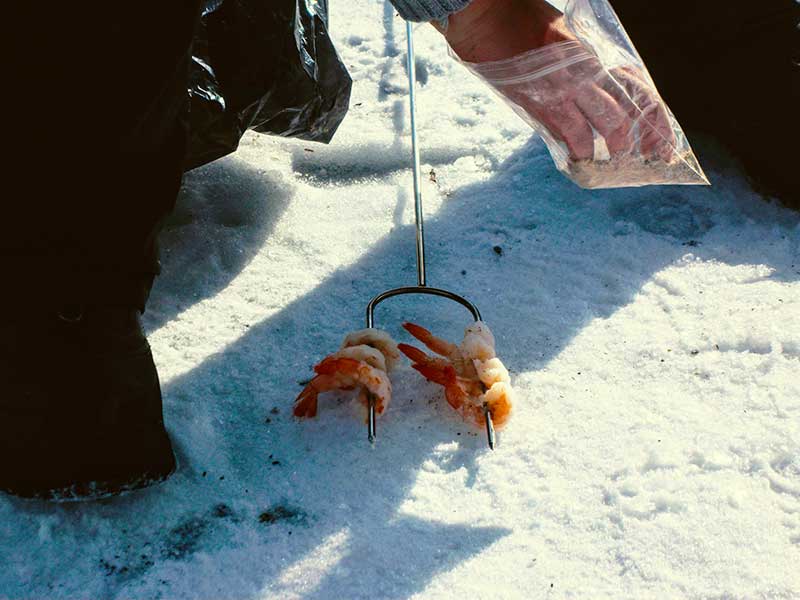
Sunscreen/Lip Balm
The sun and wind are going to do their best to wreck your face as you stand out in the open for a while, so fight back! Chapped lips and sunburns are no fun, so be prepared. The sun also reflects off the ice, so you can suck in a lot of rays. I’d also suggest taking some hand cream if your hands get dry quickly. If you’re out in the wind all day, take care of your skin hey. That rhymes and I’m awesome.
A First Aid Kit
Always a good idea to have a first aid kit in your home/vehicle anyway, but they’re especially helpful if you’re out on the ice and you get hurt. Common injuries: getting your damn fingers caught on hooks, cutting yourself with sharp stuff, getting your fingers sliced up by Northern Pike teeth. Whatever, be prepared. Ps. You should always bring extra water with you when traveling around Alberta. Never know when you may need it.
Beer
Well unless you’re driving of course. Beer and ice fishing go together like beer and anything else. The best part? You can drill mini holes in the ice to cool your beer. Growlers fit perfectly!
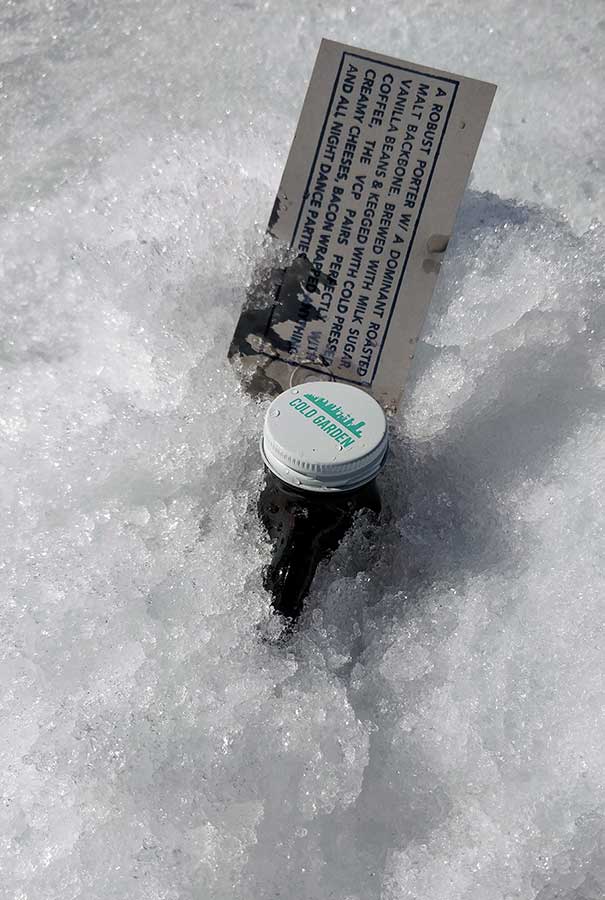
Or just bring regular cans or bottles and kick some slush up around them. I accidentally took this really sexy beer picture of Burmis Tree APA, from Six Corners Brew Works based out of Okotoks.
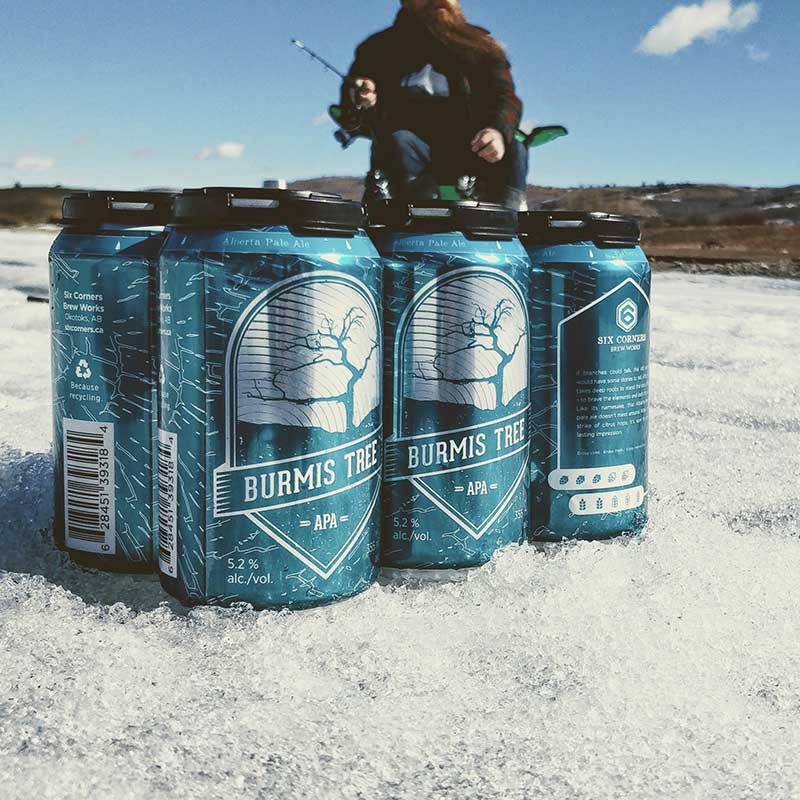
Cannabis
Only if you aren’t driving! No drugs or beer for you my friend. Everyone else though, ice fishing is a great time to smoke up with friends. It’s legal in Canada now, remember. You can’t look down on anyone for doing it! Huuyaaah! Don’t forget to bring a lighter you damn stoner.
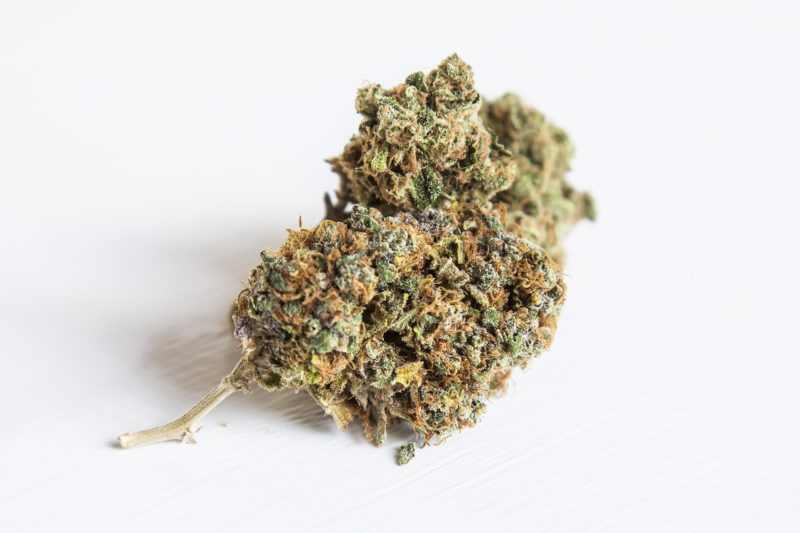
A Camera
Of course you need to bring a camera! Take pictures of the scenery, things you catch, other people fishing, yourself, everything! Trust me, bring a camera. A cell will do too, if the camera isn’t crap.
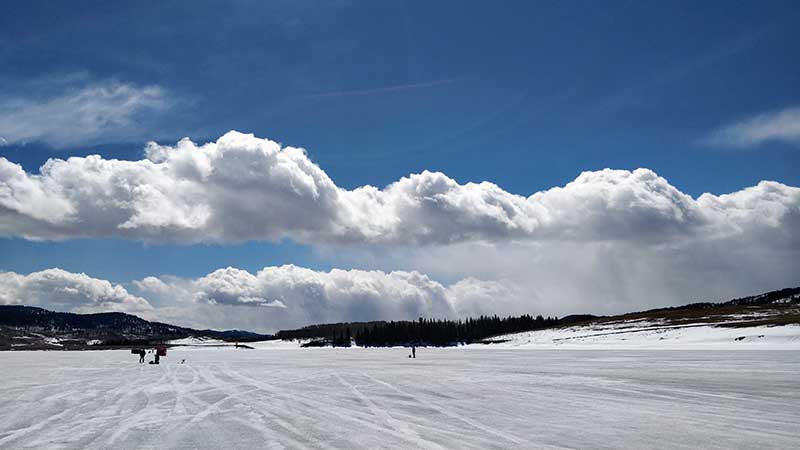
A Cooler
Having a cooler with you is a pretty good idea. They can keep your food cold, keep beer cold, transport things, you can sit on them, and you can put your fish in them to bring home!
Do You Need To Bring A Shack/Fishing Hut?
Nope! They do make it a nicer experience, but they aren’t required to go ice fishing, unless you’re planning on staying overnight (though you could just sleep in your car?). If you have a chance to get out there and spend the night in one, do it for sure! Why would you want a fishing shack? Because you can heat them and they keep the wind away. A small heater is all you need (with proper ventilation if using propane!) and you could stay out there for days. Imagine pulling out fish, cleaning + cooking + eating them all right there out on the ice, in the fresh air and nature.
Check Kijiji. Anglers are serious about stuff like this. They build all kinds of crazy cool custom shacks, trailers and other temporary fishing huts.
- Kijiji search in Calgary, for ‘ice fishing shack’.
- Kiijji search for all of Alberta, for ‘ice fishing shack’.
Alternatively you could pick up a more modern option.
When buying a heater, get something that is designed to be used in small spaces. The Big Buddy heater has an automatic low oxygen shut off, in case something goes wrong. If you’re buying a pop up tent shelter, don’t forget a light source of some kind. LED lights or a flashlight.
In addition to purchasing something, you do have the option of renting an ice fishing shack. There are several companies in Alberta that do that, plus things like fishing tours.
- http://adventureicefishing.com – Located at Gull Lake.
- https://www.facebook.com/mtriceshackrentals – Located at Gull Lake.
- https://www.facebook.com/Iceshackrentals – Located at Lesser Slave Lake.
- http://nashent.ca/fishing – Located at Lesser Slave Lake.
- https://www.lakelandexpeditions.com – Located at Lac Le Biche.
- https://www.fishingalberta.ca/winter-booking – Located in Calgary.
Have a Campfire On The Ice!
You wouldn’t think so, but having a campfire on the ice is probably pretty safe and lots of fun. I’d highly recommend trying it. You can even use Doritos as kindling (serious, look at the damn picture). I know what you’re thinking and no; it won’t just immediately melt through. It takes a long long time (heat goes up, remember).
Since you’re ice fishing and having a campfire on the ice, why not bring supplies to cook up the fish you catch, over the fire? It might be a little difficult since there’s no grill or anything, but use your imagination. Plan ahead. Maybe grab a cast iron skillet and just set it right down on the top of the logs? Figure it out man haha.
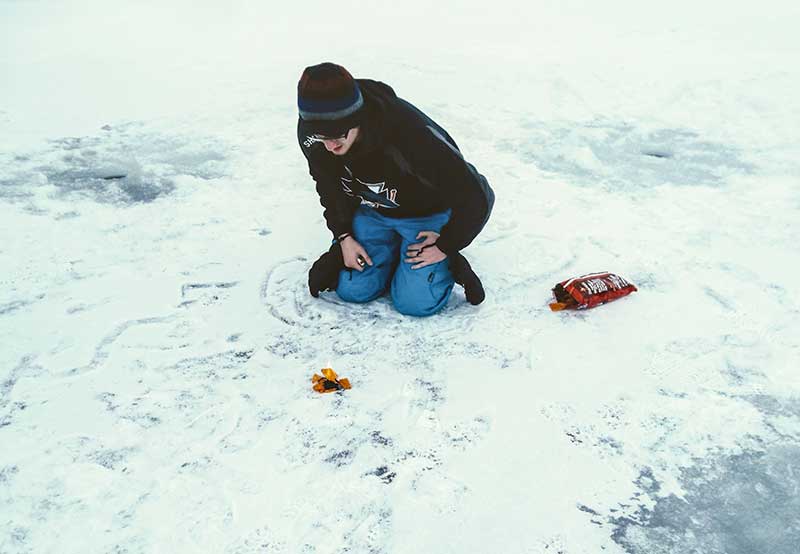
We really did start the fire using Doritos. There isn’t much too different from having a regular campfire on dry land, just remember that fire is hot and makes ice melt, which eventually will create a bit of a puddle of water under the fire.
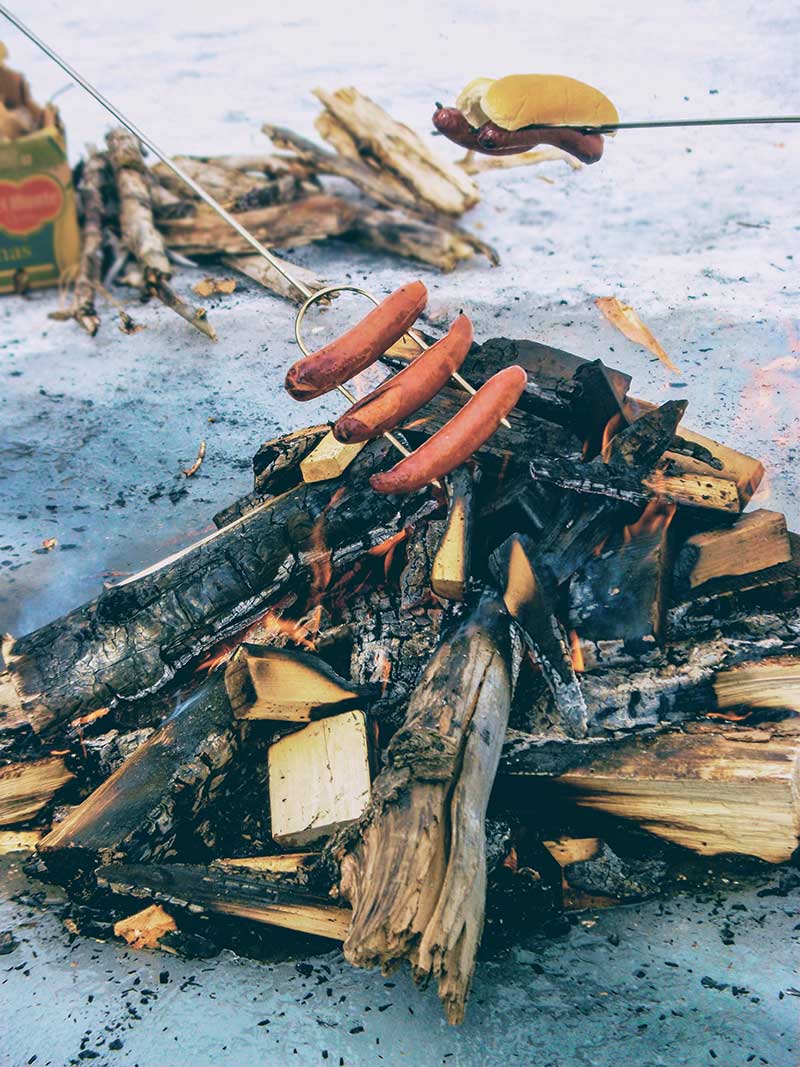
The scoop that you already brought with you should work fine for this; as the fire slowly burns you’ll do good to occasionally scoop out the water. If you don’t, it might turn into a soggy mess right away and put your fire out. It’s a slow process, but enjoy the fire cooked food!
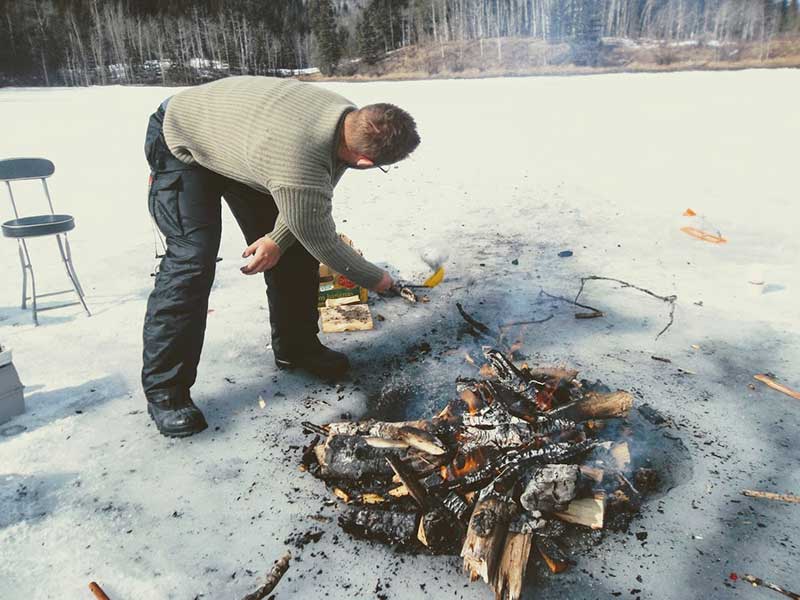
Choose A Place To Go Ice Fishing
I’ve only been ice fishing in Alberta, but really this is the same everywhere. Check the regulations and find a body of water that is still open for fishing and go there! Easy as that. It basically comes down to how far you’re willing to drive and what kind of fish you’re after. If you aren’t in Alberta, do some Googling man! It shouldn’t be too hard to find some reports.
If you’re in Alberta,
- check out http://www.albertafishingguide.com – It has information on what fish to catch where, and all of the relevant information (bait, restrictions, etc).
- there’s a Facebook group called Alberta Fishing Addicts that has tons of information and over 10,000 members.
- if you’re a redditor, check out /r/FishingAlberta on reddit.
- last but not least, the fishing forum over at Outdoorsmenforum.ca is probably the best resource for information on ice fishing in Alberta. Or just fishing in Alberta in general.
Because I’m based in Calgary, Alberta, here are a few local suggestions that are open year round (or at least during the winter months) at the time of writing this, in January 2019.
Trout
- Burnstick Lake. You can keep: 1 Northern Pike over 63 cm. 1 Walleye over 50 cm (no draw license needed!).
- Chain Lakes Reservoir. You can keep: 5 Rainbow Trout. You cannot keep Bull Trout.
- Eagle Lake. You can keep: 10 Burbot, 15 Yellow Perch. 0 Northern Pike.
- Ghost Lake Reservoir. You can keep: 5 Trout. 5 Whitefish over 30 cm. You cannot keep Bull Trout.
- Lower Kananaskis Lake. You can keep: 1 Rainbow Trout or Cutthroat Trout 50 cm or over.
- Upper Kananaskis Lake. You can keep: 1 Rainbow Trout or Cutthroat Trout 50 cm or over.
- Spray Lakes Reservoir. You can keep: 5 Trout in total, but only up to 3 Lake trout. The others are Rainbow Trout. You cannot keep Bull Trout.
- Sylvan Lake. You can keep: it depends, Sylvan Lake opens/closes a few times a year.
Pike
- Chestermere Lake. You can keep: 3 Northern Pike over 63 cm. 15 Yellow Perch.
- McGregor Lake Reservoir. You can’t keep any Northern Pike, but they’re fun to catch and release!
- Newell Lake. You can’t keep any Northern Pike, but they’re fun to catch and release!
- Pine Coulee Reservoir. You can keep: 3 Northern Pike of any size!
Find A Spot, Drill Your Holes
Picking a good spot to drill depends on you and your research. Google the body of water you’re interested in fishing and see what people say about it. There might be some suggested hot spots you can try, or you can look for information on how deep it is. Or you know what? Just show up and pick a spot! Do you believe in luck? I think there’s a certain amount of luck to it. Find a spot that looks solid and far enough away from shore that you don’t hit bottom with your auger.
I personally prefer going deep. It’s my opinion that the lunkers (biggest fish) live at the bottom of big bodies of water. If I can, I’m going deep! Like 50 feet or something. Yeah baby.
Ice Safety
- The Red Cross has an informative guide on ice safety, here. It also explains what to do if you fall in, and explains things such as ice colour etc.
- Health Canada has a guide explaining being outside in extreme cold.
- The Royal Life Saving Society of Canada too has a guide on cold water and ice.
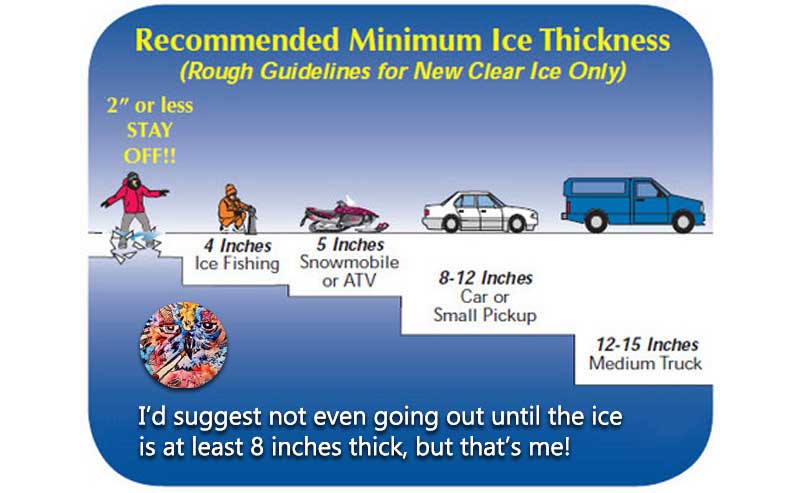
Ice Thickness
The general consensus is, if 2-3 inches – stay off! 4 inches is okay for a single person, but walk single file. I personally don’t like to head out on the ice until it’s at least 8 inches thick, or 10-12, because it’s a little intimidating. I take safety out on the ice super seriously, so I don’t want to leave things like ‘ do you think it’s thick enough?’ to chance haha.
12 inches or more and you can safely drive your vehicle out there!
This one time we went fishing at McGregor Lake. It was super windy (volume warning), but my friends actually fished from inside the comfort of their truck. I took my chances haha.
We didn’t catch fish that day, but that’s not important.
Drilling Your Holes
Drilling holes is not as hard as it looks, and to be honest it’s actually a lot of fun! Make sure your blades are sharp.
Finding a place to drill a hole
- Find a spot that isn’t too shallow
- Check depth chart maps online for the body of water you’re fishing
- Find a good depth for the kind of fish you’re after
- Once drilled, check depth with a fishing weight on the end of the line
Hand Augers
Hand augers are very easy to use, but they can require a bit of muscle depending on how thick the ice is. Once you find a good location for a hole, stand the auger up, press down on the top, twirl the handle around and drill away. It’s much easier than it looks, but after a few holes, it’s quite the workout.
Gas Augers
They’re very simple to use, just turn them on and hold steady. Here’s an excellent video demonstrating how to use a gas powered ice auger. Scoop away once drilled!
After Your Holes Are Drilled, Start Ice Fishing!
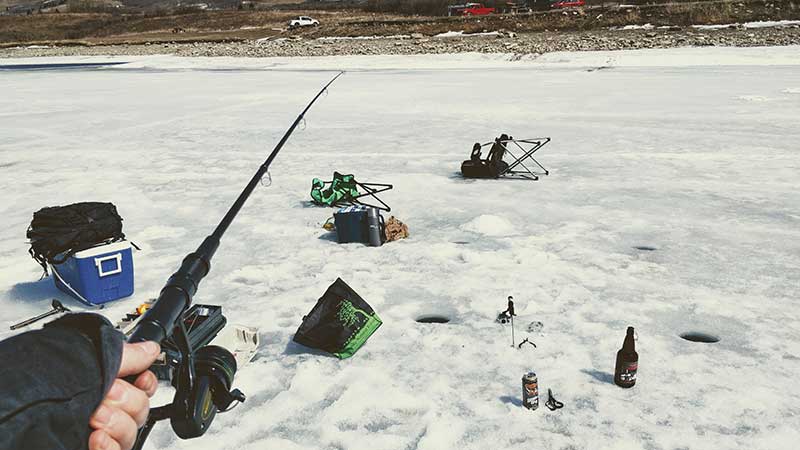
Once the holes are drilled, set up fishing camp! Unpack the beer, set your traps up within line of sight, drop a line in and start ice fishing. Hope you didn’t forget the music or sun screen.
My First Time Ice Fishing
Ice fishing is a very different experience to regularly fishing from the shore or a boat, but it can be just as rewarding and awesome! Ice fishing can be done alone, but I recommend going as a group if you can. It’s more exciting when you catch fish with friends. It can be pretty difficult to get newbies to agree to go ice fishing though, as everyone thinks ice fishing is just crazy people sitting around in the blowing snow freezing to death hoping to pull out a fish. It can be like that, yes, but it doesn’t have to be.
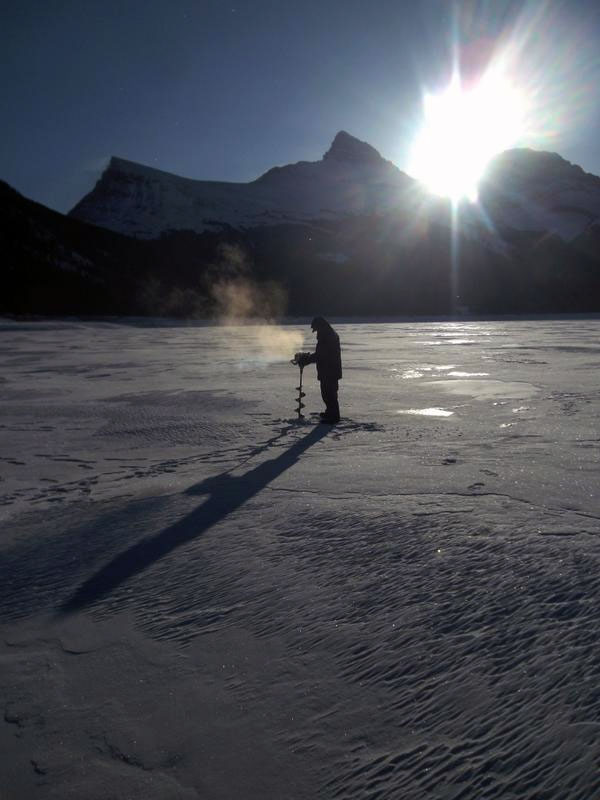
Spray Lakes
Let me tell you about my first time ice fishing. Learn from our mistakes.
We headed out from Calgary nice and early, before the sun had come up even. My buddies Tanis and Dustin picked me up in their vehicle and we headed for Spray Lakes reservoir, which is located near Canmore but up the hill in the mountains. We had made this trip before, and to many other bodies of water around southern Alberta, but this was the very first time ice fishing. Dustin (above) had borrowed an auger from his family, and we had all purchased our little ice fishing rods, tip ups (ice fishing traps), ice fishing line and tackle. We had our chairs, a little sled to pull everything on the snow from the car. No ice fishing shack, but we didn’t plan on sleeping out there, so whatever we’ll just put on a pair of boots and a jacket. We were ready!
No, we weren’t.
You see, in Alberta, and especially in the Rocky Mountains, it can get really really cold. If you look close at the above photo, the snow is twinkling. The air is frozen. The sun only just peaking over the mountains. We didn’t think about the most important thing: the weather. We picked a date to go ice fishing, found a place to go, and we went.
We drilled our holes and set up the tip ups. Set up our chairs and plunked down. The wind was howling. The temperature was something like -28 C, before the wind. It felt like -40 C. We brought supplies for a fire (including gasoline), but the wind was too much and we could not get it started, not even with the gasoline. I was not prepared for this. I managed to tie my line on to the rod, attach a lure and drop it down, but the water kept freezing in the hole because it was extremely cold. I was wearing winter boots, but my feet were frozen. Hands were frozen. Face was frozen. My friends didn’t do much better. We stuck around for as long as we could tolerate it and then left. I’d say we were there for an hour? The slow journey over the ice back to the car felt like an eternity.
The weather makes all the difference. Do not go ice fishing if it’s cold and windy (unless you have a shack/heaters – we’ll get to that). With a little planning you can have a wonderful day out ice fishing, even if you don’t catch anything.
I have been out ice fishing numerous times since without an issue. The key is not going ice fishing when the weather is miserable.
Conclusion
Something very important that I haven’t mentioned yet: leave no trace. Leave no trace behind when you fish, not on dry land or on the ice. No packaging, empty bottles or beer cans, fishing line, nothing man made!
Ice fishing is a great time out and hopefully more people get into it. If you have any questions or comments, drop them below, cheers!
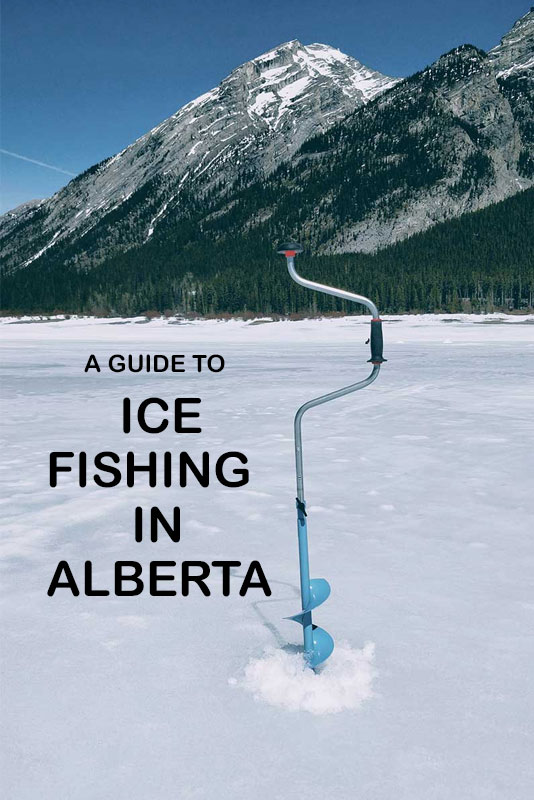

Blogging in Calgary.
Follow along on Facebook, Instagram, Twitter. Join the Calgary Discord Server!










Thanks for sharing this guide on fishing in Alberta. You can also rent a boat to explore more.
One place you missed in the list of places to rent an ice shack is on Lake Newell with http://www.TipUpIceShackRentals.com. They may have started up after you wrote the article.
Ever ice fish on pidgen lake for walleye
Good job.